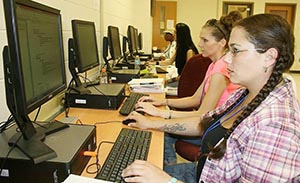By Chris Shoemaker
Women in Appalachia without access to higher education or who live in poverty have found hope in a new beginning, thanks to the New Opportunity School for Women at Bluefield (Va.) College.
Founded in 1987 at Berea (Ky.) College, the New Opportunity School for Women is designed to improve the educational, financial and personal circumstances of low-income, under-educated, middle-aged women in the Appalachian region.
 The NOSW expanded to a second site at Lees-McCrae College in Banner Elk, N.C., in 2005, and is now celebrating its third year at Baptist-affiliated Bluefield College.
The NOSW expanded to a second site at Lees-McCrae College in Banner Elk, N.C., in 2005, and is now celebrating its third year at Baptist-affiliated Bluefield College.
“I grew up in the mountains of North Carolina in a very isolated small town,” says Jane B. Stephenson, who founded the NOSW at Berea. “I knew even then that women didn’t have the opportunities that men had and that there were very different expectations for women than men.
“I want Appalachian women to have more opportunities for themselves and their families, especially through becoming more educated and ultimately having a career with benefits and increased income for their families.”
The NOSW fulfills that mission through residential programs at its college sites. The 2015 residential program at Bluefield College starts May 10 and is open to women with a high school diploma or GED (or those working toward a GED). There is no cost to attend, and all books, meals and campus housing are covered by grants and awards. Funds are also available for child care and transportation, if needed.
The three-week session includes academic study, cultural experiences, personal development, job search training, college preparation, and leadership development. Participants work 50 hours per week on a curriculum that includes a distinctive focus on Appalachian literature and culture, creative writing, personal reflection and cultural experiences in theater, museums and historical sites.
“New Opportunity School graduates walk away with a desire to make a positive change in their lives and their families’,” said Casey Palmer, director of Bluefield’s NOSW, “It’s a trickle-down effect, too, as research shows 80 percent of our graduates further their education, and 25 percent of their children and/or grandchildren go on to earn college degrees.”
